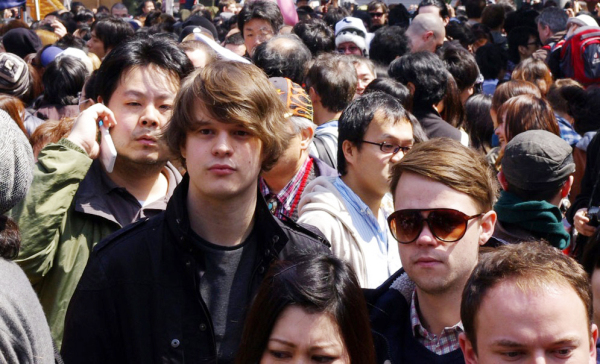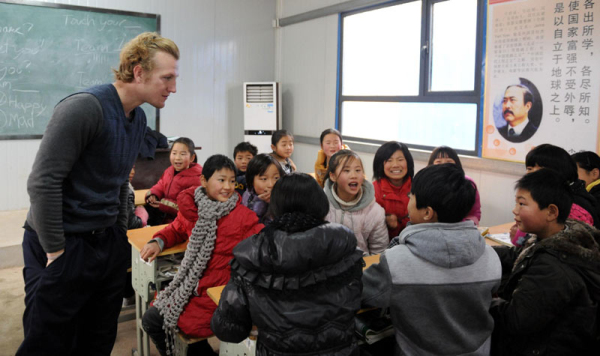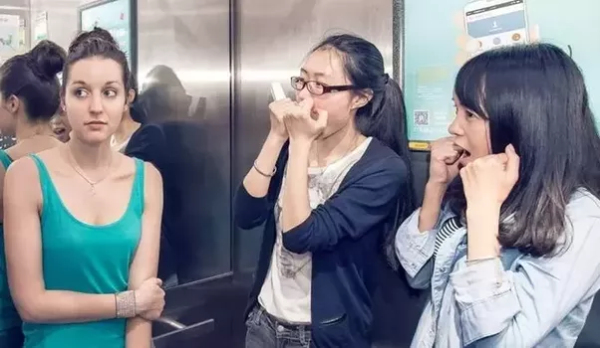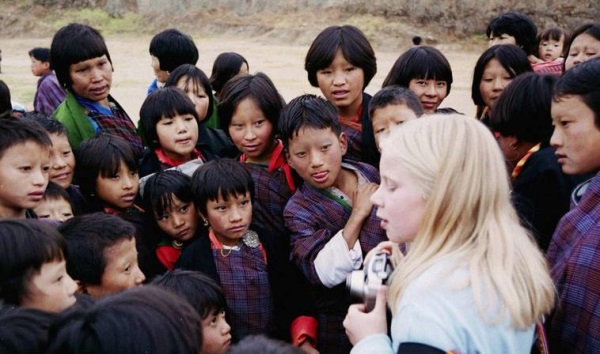Sharing Identities
By Mike Cormack
 作为世界第一贸易大国、第二大经济体,现今我国跨境人口流入范围已相当可观。2010年调查结果显示,居住在我国境内并接受普查登记的外籍人员为593832人,接近60万。其中,在我国境内居住的外籍人员数量最多的国家是:韩国、美国、日本、缅甸、越南、加拿大等。中国由此已或正在构成新的聚居外来民族群体,如浙江义乌的中东穆斯林商人群体,北京望京、5道口和青岛的韩国人群体,等等。
作为世界第一贸易大国、第二大经济体,现今我国跨境人口流入范围已相当可观。2010年调查结果显示,居住在我国境内并接受普查登记的外籍人员为593832人,接近60万。其中,在我国境内居住的外籍人员数量最多的国家是:韩国、美国、日本、缅甸、越南、加拿大等。中国由此已或正在构成新的聚居外来民族群体,如浙江义乌的中东穆斯林商人群体,北京望京、5道口和青岛的韩国人群体,等等。
随着外国人口增加,不少城市尤其是二三线城市也出现了很多外国人。但在外国人稀少的小城市中,他们在街头可能会受到“注目礼”。不少人会觉得没有见过他们,很稀奇,从而多看两眼。这有可能会引起外国友人的不适。但在大城市,这样的情况并不多见,中国人对外国人也习以为常。大部分时候中国人非常友好,对外国人没有什么歧视与偏见。但有时候对黑人朋友可能存在部分不自觉的心理歧视。这样的情况很可能会继续在未来的一段时间里持续下去。但随着人口素质的提升,相信大家对外来人口的接纳都会越来越高,并且会有更加正确的三观做引导。
 As a foreigner in China, it can be hard to directly gauge the prejudice in a society where one is necessarily an outsider. Most forms of bigotry are only expressed within the group. Their very existence can be a form of group bonding, an assertion of shared identity, albeit in repugnant form. But as a foreigner you are almost continually exposed to people’s reactions to outsiders, which is highly revealing. As with much of China, your location generally dictates what happens. In a Tier 3 city, with a population of less than two million, say, you may be one of the very few foreigners. Although Jiangsu is one of China’s most developed provinces, when I lived in Huai’an I was one among the only about ten non-Asian foreigners in a city of over a million people. This level of ethnic concentration is astonishing. Even the American city with proportionately the largest white population of over 100,000 people is only about 90% white (For major cities, the whitest is San Antonio, at 72.6%).
As a foreigner in China, it can be hard to directly gauge the prejudice in a society where one is necessarily an outsider. Most forms of bigotry are only expressed within the group. Their very existence can be a form of group bonding, an assertion of shared identity, albeit in repugnant form. But as a foreigner you are almost continually exposed to people’s reactions to outsiders, which is highly revealing. As with much of China, your location generally dictates what happens. In a Tier 3 city, with a population of less than two million, say, you may be one of the very few foreigners. Although Jiangsu is one of China’s most developed provinces, when I lived in Huai’an I was one among the only about ten non-Asian foreigners in a city of over a million people. This level of ethnic concentration is astonishing. Even the American city with proportionately the largest white population of over 100,000 people is only about 90% white (For major cities, the whitest is San Antonio, at 72.6%).
 Daily interactions as a white foreigner in a Tier 3 city veered from bemusing to exasperating. Though most people are polite, you’re an object of fascination nonetheless. Children will stare and point at you, fascinated but apprehensive. Teens will stare and giggle, but adults generally let you be. University students unfortunately inhabit a border zone where they can behave immaturely. I lived on a university campus and hence regularly encountered many groups of students, and it got truly irksome when they would say “Laowai!” to each other, or call out “Hulloooo!” once they had passed by. (In the end, utterly fed up, I started responding by saying “Goodbye!” which they didn’t really like). On campus and in the nearby streets I sometimes felt like a monkey in a zoo, which was truly discomfiting. Most students had never seen a foreigner before.
Daily interactions as a white foreigner in a Tier 3 city veered from bemusing to exasperating. Though most people are polite, you’re an object of fascination nonetheless. Children will stare and point at you, fascinated but apprehensive. Teens will stare and giggle, but adults generally let you be. University students unfortunately inhabit a border zone where they can behave immaturely. I lived on a university campus and hence regularly encountered many groups of students, and it got truly irksome when they would say “Laowai!” to each other, or call out “Hulloooo!” once they had passed by. (In the end, utterly fed up, I started responding by saying “Goodbye!” which they didn’t really like). On campus and in the nearby streets I sometimes felt like a monkey in a zoo, which was truly discomfiting. Most students had never seen a foreigner before.
In a Tier 2 city there will be a sizable foreign population so you don’t feel as though you are in a zoo, but you’ll still be a novelty to young children, though high school students will likely have had a foreign English teacher. In Tianjin I only once or twice heard kids say “Laowai” when I passed by. Being able to come and go unobserved was a great relief. But older people may still be unaccustomed to foreigners, and refuse to listen if (say) they are working in a shop or market.
 In a Tier 1 city, the foreign population is substantial and there’s no need for self-consciousness. I don’t remember ever hearing anyone say “Laowai” as I passed by in Beijing and nor in Shanghai. But there are many minor issues that can grate. Even now, local hawkers often think foreigners are rich pickings (or perhaps they are easier to manipulate) and inflate prices. People may treat you as gullible – the tea scams and so on remain common. The image of the sex-mad drunken ex-pat remains, I think unfairly. Every close male friend I had entered a relationship within around six months of arriving, ended in all but one case eventually marrying that girl. It’s perhaps true that more number of young foreigners party in bars and clubs than Chinese do, but the levels of alcohol consumption is probably less than a dinner, KTV and maotai session that a Chinese businessman might enjoy. The main pressure facing you is the same affecting all Chinese: the pressure of a vast population on common resources. Good housing, education and healthcare, and a car license plate are all difficult to access and require contacts and skillful maneuvering. As an outsider, your chances are probably substantially poorer than most locals.
In a Tier 1 city, the foreign population is substantial and there’s no need for self-consciousness. I don’t remember ever hearing anyone say “Laowai” as I passed by in Beijing and nor in Shanghai. But there are many minor issues that can grate. Even now, local hawkers often think foreigners are rich pickings (or perhaps they are easier to manipulate) and inflate prices. People may treat you as gullible – the tea scams and so on remain common. The image of the sex-mad drunken ex-pat remains, I think unfairly. Every close male friend I had entered a relationship within around six months of arriving, ended in all but one case eventually marrying that girl. It’s perhaps true that more number of young foreigners party in bars and clubs than Chinese do, but the levels of alcohol consumption is probably less than a dinner, KTV and maotai session that a Chinese businessman might enjoy. The main pressure facing you is the same affecting all Chinese: the pressure of a vast population on common resources. Good housing, education and healthcare, and a car license plate are all difficult to access and require contacts and skillful maneuvering. As an outsider, your chances are probably substantially poorer than most locals.
 As someone white and British, no doubt my experiences seem trifling. African Americans regularly face substantial discrimination when seeking work, as many employers prefer someone white. This is textbook racism. The issues faced by Africans in China are far more serious – slandered as being involved with drugs and violence, and suffering racial tensions in cities like Guangzhou where they most commonly live (albeit in moderate numbers – perhaps 300,000 in a city of 14 million). But I can only relate my own experiences.
As someone white and British, no doubt my experiences seem trifling. African Americans regularly face substantial discrimination when seeking work, as many employers prefer someone white. This is textbook racism. The issues faced by Africans in China are far more serious – slandered as being involved with drugs and violence, and suffering racial tensions in cities like Guangzhou where they most commonly live (albeit in moderate numbers – perhaps 300,000 in a city of 14 million). But I can only relate my own experiences.
On the whole, I was aware of sometimes being in a fortunate position, but I regularly felt uncomfortable in Huai’an because of the comments, staring and giggles. In Tianjin and Beijing this problem almost never arose, and I enjoyed being anonymous again. But perhaps my incomprehension of Chinese was actually a great help. If I’d known what people were saying, would I have felt so comfortable?